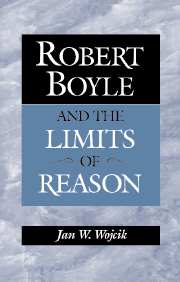Preface
Published online by Cambridge University Press: 24 November 2009
Summary
Being considered one of the “great” thinkers of the past has all too often resulted in a highly selective presentation of an individual's thought. In what has come to be known as a “Whiggish” interpretation of history, aspects of an individual's thought that are judged to have contributed to some perceived line of progress from the past to the present have been emphasized, while those that might be considered “embarrassing” from a twentieth-century point of view, such as a belief in witchcraft or alchemy, have been glossed over as vestiges of the past that unfortunately marred the otherwise progressive thought of the individual. One of the most encouraging aspects of recent Boyle studies is that Boyle scholars today are attempting to see his thought as a unified whole rather than selecting only those aspects that might be considered “modern.”
“The father of modern chemistry” was not a scientist who dabbled in alchemy on the side. Boyle had a remarkably unified worldview, a worldview in which truths in chemistry, physics, alchemy, and theology were but different aspects of one unified body of knowledge. Boyle himself was quite aware that the individual aspects of his thought were but a part of a unified whole, and expressed his conception of the whole in The Excellency of Theology (1674):
The gospel comprises indeed, and unfolds the whole mystery of man's redemption, as far forth as it is necessary to be known for our salvation: and the corpuscularian or mechanical philosophy strives to deduce all the phenomena of nature form [sic] adiaphorous matter, and local motion. […]
- Type
- Chapter
- Information
- Robert Boyle and the Limits of Reason , pp. ix - xivPublisher: Cambridge University PressPrint publication year: 1997



